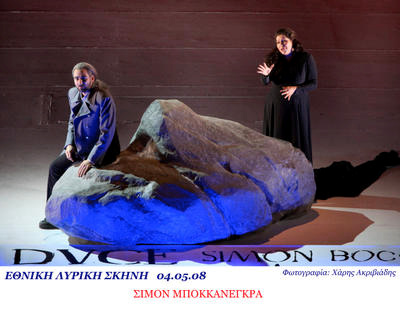Other Links
Editorial Board
- Editor - Bill Kenny
- London Editor-Melanie Eskenazi
- Founder - Len Mullenger
Google Site Search
SEEN AND HEARD INTERNATIONAL OPERA REVIEW
Verdi, Simon Boccanegra: Greek
National Opera, conductor: Carlo Montanaro,
Alexandra Trianti Hall, Athens Megaron
11.5. 2008 (BM)

Picture © Haris Akriviadis
Alden was supposed to be directing – and he likes to point out that
in this day and age, opera singers are increasingly indebted to
directors, as opposed to conductors - but alas, very little was done
here to make the acting stand out and offer the audience some
guidance with this convoluted plot. Though clearly well aware of the
deeply personal issues which Verdi wove into this work, rather than
explore the relations between its characters on stage, it would seem
that Alden’s foremost concern was to project visual concepts, e.g.
the giant silver hand created for the Council Chamber scene. To make
matters worse, Simon and Amelia sang at each other from opposite
ends of the stage during their beautiful recognition duet, and even
as he lay dying during the final scene. Interaction between the
characters was lacking across the board, and the whole thing would
have been a fairly dreary (not to mention cold) affair, had it not
been for the musicians, who delivered plenty of passion.
Dimitri Tiliakos’ debut in the title role was a fitting tribute to
(though by no means an imitation of) his teacher, the late Kostas
Paskalis, who was the last to perform – and direct! – Boccanegra
in Athens. It takes a mature artist to portray this character, who
has been referred to as Verdi’s alter ego in terms of elusive
fatherhood, and Tiliakos has undoubtedly reached this point in his
career. Although hard put to remain dignified in his Hell’s Angels
to buffoon-like attire, his was an imposing rendition of one of the
composer’s most in depth and nuanced character portraits - of a
devoted father and peace-loving politician - conveyed by Tiliakos
fluid baritone, complete with an exciting high register and a
velvety low range.
Chilean soprano Angela Marambio was Amelia, in what has become a
signature role for her, and she was luminous after overcoming some
initial trepidation during her first aria - even when Alden had her
bending over backwards (not the easiest posture to sing in, one
would imagine). Sadly, her partner Francesco Demuro was light-years
out of his league as Adorno, his tenor just about as non-descript as
his CV. Balint Szabo as Fiesco did well, but his bass was lacking in
timbre when reaching for the lower notes. Dimitris Platanias had the
physical advantage of looking his part as Paolo the villain, but was
also in excellent voice throughout and made a crucial contribution
to the effectiveness of the wonderful Council Chamber scene – as did
Marambio’s mesmerizing trill on “pace” shortly before the mood
switched from the shining F# major of the peace hymn to the somber C
minor of the curse. Needless to say, none of this would have been
possible without a fully focused GNO chorus (under Nikos Vassiliou)
and orchestra, conducted by Carlo Montanaro. The astounding job he
did with this ensemble was particularly perceptible in the way they
brought out Verdi’s magnificent musical description of the sea, and
Montanaro’s interaction with the singers was palpable as well. Who
says conductors don’t matter any more ? !
Bettina Mara
Back
to Top
Cumulative Index Page
